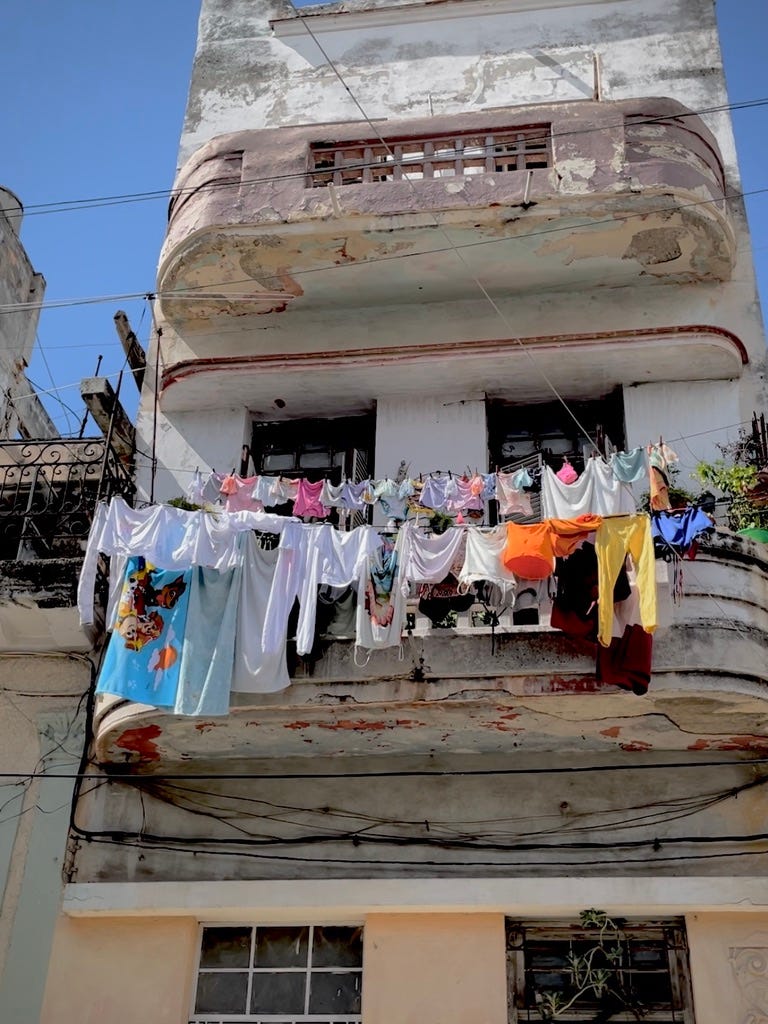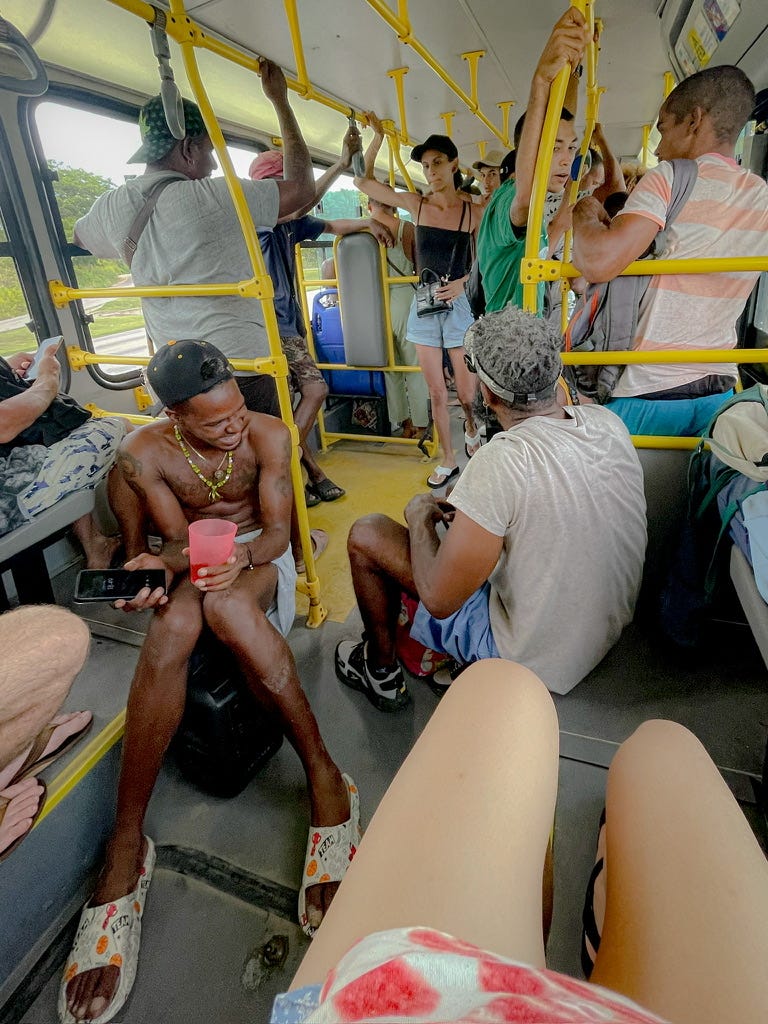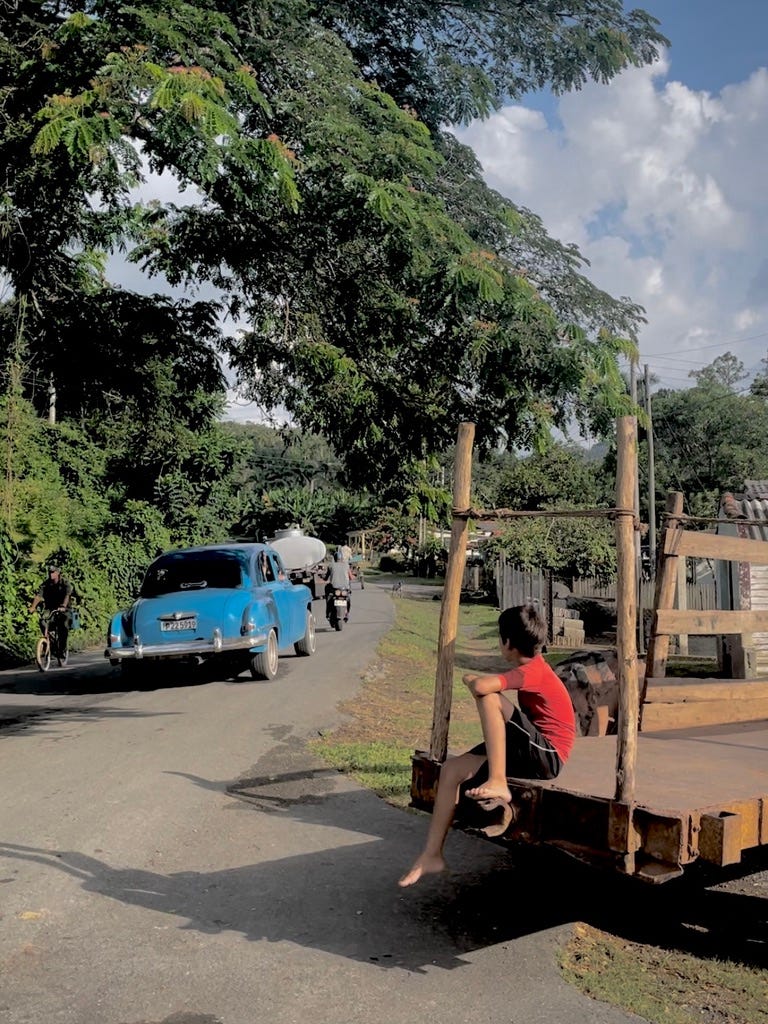EL GRAN MONGUY
Ramón Lamoruth is maybe 5'2" and his brown skin wrinkles along his smile. We first met him outside of José Martí airport, waving a hand-made sign that read RAMON Y ERIC, big block letters written in red marker on a piece of cardboard. When he saw the recognition in our eyes, he threw his arms wide open and he kissed our cheeks like we were long-lost family. Welcome to Cuba, he said. He pointed at the sign in his hand—he was up quite late last night because he wanted to make sure the sign was muy bonito. He broke it in half across his knee and tossed it into a nearby bin. Call me Monguy, he said. He preferred the diminutive.
He led us to the entrance of the freeway then flagged down a brown Volkswagen that must have seen the rise and fall of the USSR. We were going to Havana Centro and the driver wanted thirty dollars. Monguy frowned, shook his head, waved his hands. No, no, no, no, no, twenty dollars, por favor. He claimed that we were students with no money who had come all the way to Cuba to study medicine and after some haggling the driver reluctantly accepted. As he loaded our bags into the trunk, Monguy turned to us and winked.
I looked at Eric, but he was looking back at me with the same bewilderment. To be clear, we were not in Cuba to study medicine. We were just tourists. A friend of ours had met Monguy a couple months prior when he was visiting Cuba himself. He’ll show you around, was all he said before giving us Monguy’s number.
On the ride to Havana Centro, we learned that he's lived in Havana for nearly fifty years, and that he used to teach guitar but now he makes a living mostly by becoming friends with tourists. He has four children, the eldest a brain doctor. His girlfriend lives in France. He and the taxi driver then laughed and joked with each other for the rest of the ride as if they’d known each other all their lives. He took the driver’s number at the end of the ride. Half of Cuba lives in Monguy’s contacts.
Later that evening, he took us out to Casa de la Musica, a live music club where the Buena Vista Social Club sometimes played. We sat ourselves down at a table near the bar and ordered a bottle of rum to share. Just as we cracked open the seal, a man approached, pale and balding, and requested that we get up as he had saved the table for him and his lady. He pointed at a rag perched on the edge of the table. Eric and I started to get up, not wanting to argue, but Monguy gave us a sharp look and told us to sit back down, please. He strides over with a puffed chest to the man who is 7 inches taller than him. No, he said. They started arguing, Monguy with big, impassioned gestures and the man with crossed arms; we tried to tell him that there are plenty of tables around, there’s no reason to fight, but the music was loud and Monguy was adamant. They tried to get the establishment involved but they didn’t give two fucks—figure it out, they said with a shrug. We insisted on moving over until Monguy finally conceded but not before giving the man one last vicious glare. He sat down; we poured the rum.
Not even ten minutes passed and the next thing we knew Monguy had his arm around the man, laughing and adding our rum to the man’s soda. Monguy swaggered over to the woman too and took her hand and twirled her around in an explosive display of salsa. He punctuated the end of the dance with a thrust of the hip.
We were with Monguy for four days.
He called me hija and Eric hijo, and he called us Romeo and Juliet. (I’m stuck in the washing machine.) He stood close when he talked and he grabbed my wrist without warning and he maybe too often referred to me as la chica asiatica. His English was very good except when it wasn’t. Sometimes he’d say, “My mother? She dead,” as he drew a thumb across his neck, kissed his finger and lifted it to the heavens. It was bizarre until we later realized he meant something like “I swear on my mother’s grave.” So we communicated mostly in Spanish. Everywhere we went, it was important to him that we knew that we were paying cubano prices, not tourista prices. He would punch in the prices into the calculator on his phone to convert them to dollars, then back to Cuban pesos, then back to dollars. He talked in threes. Mira, mira, mira, he said as he pointed to his eye. Look, look, look. Everywhere we went, Monguy found himself hermanos and hijos and tias and primas and they in turn found Monguy and I wondered how it might feel to live so unguardedly. Listen to me please, listen, you’re not listening! Listen to me.
On one of the days we found ourselves in the living room of a local resident in Viñales, a rural town two hours west of Havana. The innkeeper had mentioned earlier that day that her sister was selling cigarettes for cheap, two hundred pesos a pack. This was very exciting news to Monguy, who was never without cigarettes. (Soy cubano, a meal and a cigarette is all it takes to keep me happy.) He started punching in the numbers in his calculator app to illustrate to us that the two hundred pesos it will cost to buy a pack of cigarettes in Viñales is certainly cheaper than the two hundred and twenty pesos it costs for a pack back in Havana, an irresistible deal. Eric and I don’t really smoke, but that’s besides the point.
The innkeeper’s sister had kind eyes. She motioned for us to sit down as she went into the next room to fetch the cigarettes. There were no doors; instead curtains separated the two rooms from the living area, where four wooden chairs were turned towards the center, towards each other, and an old TV off to the side played some kind of talent show. The floor was concrete and the walls were pink, the chairs were painted a baby blue and the embroidered seat cushion was yellow. A handful of framed family photos were the only decorations. Sat in one of the chairs, I thought at the time that the house felt too bare—but now I wonder if I’m just accustomed to houses that overflow with forgotten knickknacks and chairs that face away. All the doors and windows were left wide open to let in the moist afternoon sun and the dog.
When we were back in Havana the next day, I saw more of the same scenery as we wandered the streets until nightfall and watched the lights come on home by home. The air stuck to our skin but the children were still at play and their mothers kept a watchful eye through the window as they made dinner. Grandparents played cards around the table and neighbors lingered on each other’s doorsteps. Lives spilled out onto the streets.
That was last August. Now Eric and I are back to our cluttered lives and Monguy wants to leave Cuba. He intended to go to France with his French girlfriend, but seeing that his Facebook relationship status has been updated to single, that plan hasn’t panned out. Now he’s considering employing coyotes to find a way to Mexico and then up to Miami (or as he spells it, MAYAMI), but coyotes are dangerous and he’s not sure that he wants to take on the risk. In the meantime, he sends us besos.






